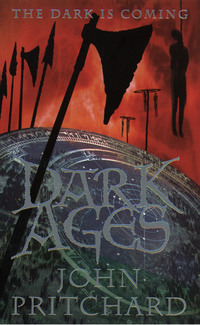
Полная версия
Night Sisters



Copyright
This novel is entirely a work of fiction. The names, characters and incidents portrayed in it are the work of the author's imagination. Any resemblance to actual persons, living or dead, events or localities is entirely coincidental.
HarperCollinsPublishers Ltd.
1 London Bridge Street
London SE1 9GF
Copyright © John Pritchard 1993
Lyrics from Ribbons © 1990 reproduced by kind permission of Eldritch Boulevard Ltd/EMI Songs Ltd
A version of the opening chapter of this novel first appeared in The Dark Side magazine under the title On Her Deathbed.
John Pritchard asserts the moral right to be identified as the author of this work
A catalogue record for this book is available from the British Library
All rights reserved under International and Pan-American Copyright Conventions. By payment of the required fees, you have been granted the non-exclusive, non-transferable right to access and read the text of this ebook on screen. No part of this text may be reproduced, transmitted, down-loaded, decompiled, reverse engineered, or stored in or introduced into any information storage and retrieval system, in any form or by any means, whether electronic or mechanical, now known or hereinafter invented, without the express written permission of HarperCollins ebooks
HarperCollinsPublishers has made every reasonable effort to ensure that any picture content and written content in this ebook has been included or removed in accordance with the contractual and technological constraints in operation at the time of publication
Source ISBN: 9780586217696
Ebook Edition © OCTOBER 2016 ISBN: 9780008226909
Version: 2016-10-26
Praise
‘A good old-fashioned tale of battling evil, which turns into a roller-coaster ride to heights of gut-churning suspense and real terror’
RAMSAY CAMPBELL
‘A taut and fast-moving tale with bags of authentic detail and a slam-bang finale’
STEPHEN GALLAGHER
‘Night Sisters is one of the creepiest and most shocking novels I’ve read in a long, long, time. The writing is superb. The story is brilliantly eerie, marked by stunning shocks of violence’
RICHARD LAYMON
Dedication
TO
THE COMPANY OF BRIGHT ANGELS
(sweet dreams …)
Epigraph
Don’t be afraid now:
Just walk on in.
The Sisters of Mercy
Contents
Cover
Title Page
Copyright
Praise
Dedication
Epigraph
PART ONE: Night Casualties
One
Two
Three
Four
Five
Six
Seven
Eight
Nine
Ten
Eleven
Twelve
Thirteen
Fourteen
PART TWO: Night Watchmen
Fifteen
Sixteen
Seventeen
Eighteen
Nineteen
Twenty
Twenty-One
Twenty-Two
Twenty-Three
Twenty-Four
Twenty-Five
Twenty-Six
PART THREE: Night Sisters
Twenty-Seven
Twenty-Eight
Twenty-Nine
Thirty
Thirty-One
Thirty-Two
Thirty-Three
Thirty-Four
Thirty-Five
Keep Reading
Acknowledgements
About the Author
Other Books By
About the Publisher
PART ONE
Night Casualties
One
They told me afterwards that when Mrs Lennox died, Jenny – who had the reputation of being the most cheerful, most patient, most loving nurse on the gerry unit – had been heard to say, quite clearly, ‘Thank Christ for that.’
You might find that a shocking sentiment; but the girls who told me it didn’t think so, and neither did I. We knew well enough what Jenny had gone through; had seen how that grim old woman had worn down her patience, and turned her bright-eyed enthusiasm into bitterness and tears. And we’d seen more. We’d seen her fear. For all her cool professionalism, she had come to dread that darkened room and its occupant at the far end of the ward. Uncomprehending, her friends and colleagues had shrugged it off: ignored the signs. Only now did we realize that Staff Nurse Jenny Thomas had been truly afraid of entering that room alone, even after its occupant had died. In fact, especially after its occupant had died.
It had been a sombre winter afternoon when the doctor was called round to certify Mrs Lennox dead. By all accounts he’d done so as quickly as possible, and left the small, malodorous room with some haste. Jenny had described the old woman to me once, and I could picture her lying there, with that waxen immobility that immediately distinguishes death from sleep. A gaunt face staring up from the pillow, its lines of age contrasting bizarrely with the jet-black of her dyed hair. Eyes still half-open; jawbone slack.
There were no relatives to inform, so at least they’d been spared that thankless duty. The problems began when Jenny refused to lay the body out.
Sister accepted that the patient had not been noted for her personal hygiene: nightdress and bedclothes were stained and stinking. The body was still damp with the patina of sweat raised by the final struggle against death. Of course it wasn’t going to be a pleasant job, but it had to be done, and besides, they needed the bed.
Still Jenny had refused.
She was reminded of the staffing situation – two trained nurses including herself (Sister was about to go off) and a completely inexperienced student, to run a twenty-bed ward. The other staff nurse was starting the drug-round; Jenny would have to do the body, and do it on her own.
A third time she’d refused. The Sister must have been quite nonplussed, getting this from an experienced nurse like Jen: a girl she knew and liked. But she had no option now but to threaten disciplinary action. And finally, reluctantly, Jen had relented, and turned back towards the room where the body of Mrs Lennox lay waiting for her ministrations.
Laying-out is standard procedure, of course. The body is washed, the limbs straightened; the orifices plugged with cotton wool. Not a nice job at the best of times, but when you’re doing it alone it can be quite unnerving. Me, I’ll find myself talking to them sometimes – explaining what I’m doing, apologizing for the indignities. I still remember that time I rolled a body over and the air trapped in its chest escaped in a long, sepulchral sigh. That was back when I was in my second year. I was shaking for hours.
So I knew how Jenny must have felt, washing that cooling corpse in the grey winter dusk; all alone in the room. At one point she’d emerged for a breather, and was talking with the student when abruptly she’d shivered and turned round sharply. The rather startled first year had asked her what was wrong, and she’d said, nothing; but I reckoned I knew otherwise. With her back turned to the body, she’d felt something – some shift in the air behind her, some coolness on the nape of her neck – that made her feel she was being watched. Maybe she was half expecting the corpse to have moved, be it ever so slightly, since she’d seen it last.
Either way, she’d returned to the job in hand; and after a while the porters arrived with their clanking tin trolley to collect the deceased. The body in the room, shrouded now and wrapped in a sheet from head to foot, was unceremoniously loaded aboard and wheeled off towards the lifts and, via them, the mortuary fridge. Jenny couldn’t have been the only person to have thought, good riddance.
Shortly afterwards, the same student nurse was sent down past Mrs Lennox’s old room to the equipment cupboard in the darkened link corridor beyond it. She’d got what she came for, and was just about to return when another nurse emerged from the ward after her.
That was her first thought, anyway, going by the uniform. But the figure was hunched, and wizened, and coming with slow, shuffling steps. In the moment before her eyes readjusted to the gloom of the corridor, she’d had the grotesque impression of a young nurse who’d aged decades overnight, worn out by the pressure of work. And then she saw the face.
Mrs Lennox’s face, framed by the stringy black hair spilling out from beneath the nurse’s cap: grinning at her.
The poor girl fainted then: it may sound like a cliché, but maybe you would have too. When she came round, the ‘nurse’ was nowhere to be seen – and, back on the ward, neither was Jenny. A search of the whole floor proved fruitless.
I don’t know at what stage the first, horrible doubts began to occur to people; but eventually someone suggested a visit to the morgue. Perhaps it was just an attempt to placate the student, who was near-hysterical in her account of the dead patient come back to life. So down they went, into the cold room: opened the compartment where Mrs Lennox had supposedly been stored, and pulled out the muffled form within. And even before they’d unwrapped the sheet from around the head, I think they must have realized who they’d find.
It was Jenny, of course, cool and naked in her shroud; her body washed and prepared in the proper manner. Someone had strangled her with their bare hands. Someone with very long and unkempt fingernails.
Mrs Lennox hasn’t been seen since. Under questioning, the certifying doctor admitted that he’d been for so long without sleep that he might have omitted to check for all the vital signs, and overlooked some spark of life still remaining. And Jenny Thomas had once told me, in wide-eyed earnest, that the woman was evil. That the woman was a witch.
One of them was right, of course. I really hope it was the doctor.
But now, sitting here in the gloom … and listening to the silence of the corridor outside … I didn’t think he had been.
Two
Maybe I was just in one of those moods.
Casualty was proving quiet tonight. The usual influx in the hour after closing time had long since slowed to a trickle, the last stragglers from the rearguard of yesterday’s business – leaving us in limbo to wait for the morning. And you can get to thinking strange thoughts at four a.m. or so, in the emptiest watch of the night, with dawn still several hours distant. I was certainly tired, and slightly edgy: this being my first Night On after returning from sick. Still out of the rhythm. But there was more to it than that.
I’d loved Jenny Thomas – really loved her. And she’d been murdered, quite wantonly, by … whom? A geriatric old woman? That I could not believe. Yet who else could have done it?
Or what else?
Silly sort of question, you might think; and only a month ago I’d have given very short shrift to any idea of a supernatural factor in my best friend’s death. Maybe in the warm light of day I still would. But now … sitting here at my desk, in my dimly-lit office; nursing a mug as I tried getting to grips with next month’s off-duty roster … my brooding mind kept coming back round to a few uncanny experiences of my own. Things like those limping footsteps I’d heard in an empty ward, back when I was doing my training. Or the sudden drop in temperature one night on Surgical, when a patient passed away.
Or the accident last week that almost killed me.
I’d just been driving over to visit a friend. She lived out in the sticks, and the town was soon behind me, sprawled like a galaxy of orange suns in the early winter night. The afterglow faded, and there was only the unlit country road, its twists and turns illuminated by my headlamps, and darkness closing quickly in behind. I’d been late, and put on a bit of speed. And as I rounded a bend, a figure had appeared in the road ahead, walking straight towards me: as dark as shadow, and as insubstantial. I remember swearing, and swerving – and then nothing until I came to on my side in a ditch: still strapped into my silent, crumpled Fiat Panda. I’d slumped there, helpless, feeling sick and numb and waiting for the pain; yet part of me had still been able to register the fresh, clean night air wafting in through my shattered window. That, and something else – something I sensed rather than felt, but which set me shivering abruptly. Because suddenly I knew I was being watched from out there in the darkness: watched by something alive, and aware of me; something inexpressibly cold. Something which paused for an endless moment, and then passed on, eventually fading altogether into the milder coolness of the night.
I’d been almost hysterical by the time they got me out: delayed shock, of course. After a night in the Obs Ward and some generous medication, I was feeling better, and almost ready to accept that explanation. I’d been dazed: not thinking straight. They reckoned there might have been some concussion – and I was lucky to get away with only that. As for what I’d seen in the headlamps – well, there was no sign of an impact, although it had seemed he would walk into me head-on. Some freak optical illusion, then. Or even a product of stress and tiredness. When did you last take a holiday, Miss Young?
So there I’d been, just resigning myself to a week off work, and putting up with the good-natured ribbing of the staff (who found it most amusing to have their own Sister as a patient – though I know they’d been pretty shaken up when the ambulance brought me in), when I got to see a copy of the local paper. My own accident featured prominently, of course – but it hadn’t been the only one that night. A number of minor collisions and near-misses had occurred across town, and those involved had all spoken of much the same cause: a shadowy figure glimpsed in the road ahead, walking directly towards the oncoming traffic. Yet no trace of anyone had been found; by the time the shaken drivers had recovered their wits, the street or road had been deserted. It was fortunate, the paper concluded, that only one serious accident had resulted from what had clearly been some kind of reckless practical joke.
I’d showed the article to Karen when she came round to do my obs. ‘Told you I wasn’t seeing things,’ I pointed out, with some satisfaction.
‘Maybe not – but you could still use a rest,’ she’d answered sweetly – and shoved a thermometer in my mouth.
Round and round my coffee went: a spiralling milky slick. The cubicles stayed empty. The phones stayed quiet. Resus was about as tidy as it was going to be.
A reckless practical joke, the paper had said; but again – somehow – I didn’t think so. I could still feel the chill – that icy presence in the night. Something cold had passed close by in the darkness, as I’d lain there trapped and trembling. I knew, instinctively, that whatever it was had definitely not been human.
What it had been, was anyone’s guess. But I also knew, with a sick little certainty, that if it had paused to investigate my car, I would not have survived the experience.
That in itself was a sobering thought – especially for someone as calm and rational as I usually am. But more, it put a whole new slant on Jenny’s death: a fresh and unsettling factor for my consideration. For if there really were such things as ghosts … and cold black shapes that walked the night, even in this day and age … then maybe dead people came back to life, too – and strangled pretty nurses.
Of course this hospital has one or two ghosts of its own, or so the stories go; and I suppose I’d enjoyed listening to those stories, and half-wanted to believe them. But it had taken this last encounter, inexplicable and frightening, to really set me thinking.
And now I’d started, it was proving very difficult to stop.
Getting on for four-thirty. Still dark outside, still silent; the town dead but dreaming in its sodium haze. But things would be stirring soon enough: lights coming on in bathrooms and kitchens, and the first commuters and early shift workers driving out on to the empty roads. It had been a quiet night so far, but, who knew, we might be able to fit in a good road smash before breakfast.
The thought drew my lips into a humourless smile, though I scarcely noticed it. Pushing the Off-duty to one side, I paused, surveying the desktop clutter – then reached for this week’s copy of Nursing Standard, and the article on management in A&E I’d been trying to take in. I picked the mag up; and put it down again. Something else was nagging at me now – reawakened, I knew, by the memories I’d been brooding on. I could always try ignoring it, of course; I’d tried before. But it never seemed to do much good.
Still clutching my cooling mug (Sister’s taste for iced coffee was a departmental in-joke), I left the office and wandered down the corridor towards reception – pausing at Utility to look in on Mike and Brenda at their stocktaking. Tonight of all nights I was glad to find them still refreshingly cheerful, even at this ungodly hour.
‘Everything okay?’
‘Couldn’t be better,’ Mike grinned. ‘We can get on with our work without bloody patients interruptin’ us all the time.’
He made a note on his clipboard and resumed his rummaging in the wall unit; the sleeves of his white nurse’s coat rolled back to the elbows, and his tie hanging slack. The casual touches somehow made him look all the more professional, but that was Mike for you. ‘So laid back he’s bloody horizontal’, as one locum medic had complained to me: one too full of his own importance to recognize that Michael Shannon was every inch the staff nurse his blue epaulettes proclaimed.
Brenda carried on with her own inventory, smiling quietly to herself. I reckoned the two of them had been making eyes at each other just before I’d appeared – which was fine by me, because Mike had been paying me quite a bit of attention of late, and I’d got the distinct impression he was shaping up to ask me out. He was a nice bloke, too – and I didn’t like the idea of him wasting his time.
‘Seen Fran?’ I asked.
‘She’s around. I told her she could give the blackboard a clean if we stayed quiet.’
‘Michael. We haven’t had anyone in for three hours, it’s already clean.’
‘Well I suggested she could chalk in the numbers, then wipe it again …’
Staff Nurse Frances Stansfield was our newest addition. She’d get used to him.
Leaving them to it, I continued on through the department – very aware of the stillness around me, and the bleakness too: that cold hospital aura, honed by bright light reflecting off sterilized surfaces and bare polished floors. I passed the unlit Resus room, and the row of parked trolleys at the ambulance bay, before turning left into the silent reception area – unmanned at this hour, since we’re only funded for clerical staff from eight p.m. to midnight. The front office was in darkness, save for the dim, ghost-green glow of the two VDUs at the desk. Beyond the receptionists’ windows, the waiting area itself seemed over-lit and very empty, a long room filled with rows of standard-issue seating – moulded plastic chairs which, as Mike insisted on pointing out, came in the tasteful NHS colour choice of bile green, puke orange, pus yellow and brain grey. Some were still strewn with old magazines from the reading rack: creased Bellas and dog-eared Cosmos. At the far end, the night pressed cold against the closed double doors.
I was still trying to kid myself that I was just killing time as I went into the office and took a seat in front of the nearer VDU. I didn’t bother with the light; I could almost feel my face soaking up the green-screen glow. And for a long moment I just sat there, staring, as if mesmerized by the endlessly blinking cursor. Then I leaned forward and typed in a name, watching it spell itself out across the screen.
KAUFMANN, JOSEPH
The computer beeped, and flashed up a request for further information. I had it ready, knew it now by heart.
D.O.B. – 29/07/32.
ADDRESS – NFA
DATE ADMITTED – 14/06/93
The drive whirred quietly, and in another moment the patient admission data was unscrolling before me. Joseph Karol Kaufmann, age 60, no fixed address, no GP. Admitted by ambulance 21:54. Died in department 22:16.
There was other info too, and various coding references; but that was the gist. Somehow it didn’t quite convey the impact of the event. It had all seemed a routine admission to start with, to be sure. But it wasn’t. Oh no.
Ambulance Control had – given advance warning: collapse coming in, severe chest pains. I’d finished taking the details of pulse and b/p over the phone, and handed the scribbled note to Kathy Jones, who was the doctor on for that night, as we made our way to Resus. From the way she squinted at it, running her free hand back into her dark, tangled hair, I got a hint of just how tired she was; normally she never let it show.
‘Is he conscious?’
I nodded. ‘Bit delirious, apparently. Look like an MI to you?’
‘Um. Probably. We’ll get him wired up as soon as he’s in.’
The ambulance arrived a couple of minutes later, and I went out to meet it, hugging myself in the chill night air as I watched the crew unload. The man on the trolley looked wasted and gaunt, his face almost paler than the pillow. We wheeled him in through the ambulance doors, bypassing the waiting area’s walking wounded; one or two people glimpsed us, and stood up to gawp.
On into Resus, where the routine began to unfold around him with the quiet confidence of endless practice. We transferred him across to our own trolley, and Karen and I sat him up and helped him off with his coat and shirt – from the state and smell of them, the bloke was in off the streets – while Mike and Kathy set about preparing the ECG. I spoke to the ambulancemen as I worked, checking details; Karen kept talking to the patient, softly and calmly, trying to ease the panic that shone in his frantic eyes.
Helen Wright was at my elbow, less the wide-eyed student by now and anxious to help. I gave her the clothes to bag up, calling goodbye over my shoulder to the ambulance crew as they left. See you again, lads … The electrodes were already pasted to our patient’s scarred and bony chest, and Kathy was studying the readout. ‘How’re we doing?’ I asked.
I got the impression she wasn’t quite sure. But after fingering her way through the length of readout tape, and listening to his heart sounds again, she nodded to herself, and glanced across.
‘MI. We’ll make sure he’s stable, then get him upstairs to Coronary Care. Will you let them know, Rachel?’
I was already on my way over to the phone, handing my drug keys to Mike as I passed. ‘Diamorph?’ he asked, and I nodded.
‘We think you’ve had a myocardial infarction,’ Kathy was telling the patient, speaking slowly and clearly. ‘A minor heart attack. We’re going to have to admit you for …’
The man looked at her then, and that look left even Kathy lost for words. In the midst of that pale, sweating face, his eyes were glazed and staring – and the despair in them was almost frightening. Deep in his throat, he gurgled.
Here comes the vomit, I thought resignedly, and wondered if Karen would move quickly enough to avoid getting it all over herself this time. Kathy drew back prudently, and I was already reaching for the plastic bowl when I noticed something that made me hesitate … and frown.





